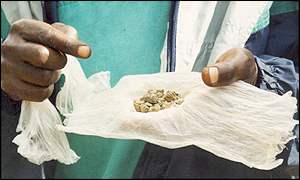| You are in: Business | ||||||||||||||||||||||||||||||||||||||||||||||||||||||||||||||||||||||||||||||||||||||||||||||||||||||||||||||||||||||||||||||||||||||||||||||||||||||||||
|
Tuesday, 18 February, 2003, 11:41 GMT
Rwanda denies DRC plundering

The Democratic Republic of Congo is rich in coltan
The Rwandan government has denied UN accusations that it is plundering the natural resources of neighbouring Democratic Republic of Congo (DRC). A UN report last year detailed how the Rwandan Government and army, the Ugandan army, and Congolese and Zimbabwean Government officials continued to exploit the DRC's resources.
But Rwandan Commerce Minister Dr Alexandre Lyambabaje told BBC News Online: "Up to now we have been meeting the UN inspectors and they have not been able to give us evidence of what is in the report. "Rwanda withdrew the troops from DRC... and if there is support to different companies it is not from Rwandan troops." Resource struggle DRC is rich in natural resources including gold, diamonds and rare metals such as coltan, which is used in mobile phones. The scramble for those resources fuelled a four-year war in which 2 million people have died.
Uganda and Rwanda invaded Congo in 1998 to back rebels fighting the government and the war then sucked in armies from Angola, Zimbabwe and Namibia. Most foreign troops have now withdrawn, and Uganda is due to pull-out its remaining 2,000 soldiers by 20 March. Rwanda left demobilised soldiers behind to operate the "Congo Desk of the Rwandan Patriotic Army", which in 1999 contributed $320m - or 80% - of the Rwandan military budget, the UN panel said. MONUC (UN mission in DRC) in January issued a statement saying it had verified that there were no uniformed Rwandan troops in eastern DRC. UN role Dr Lyambabaje rejected allegations that Rwanda's withdrawal created a power vacuum that allowed the plundering and called on the UN to take responsibility. "We would like really to see the UN, DRC and other partners to play their role," he said. "Rwanda signed an agreement to withdraw and the international community took the responsibility to take over where troops withdraw from." Dr Lyambabaje said if there was illegal activities it would be dealt with. "DRC and Rwanda are members of Comesa (Common Market for Eastern and Southern Africa) which means, once you respect the rules of trade I don't see the reason why Rwanda companies or business men and women cannot trade with people from DRC," he said. "Once there is a company which is not respecting the rules then those companies should be condemned under international rules." The DRC government in Kinshasa, armed groups, and opposition politicians are due to resume talks in South Africa on Thursday on a transitional constitution and an all-party government. The companies and individuals named in the UN report, including from the UK, have until 31 March to defend their actions in DRC.
|
See also:
04 Dec 02 | Africa
22 Oct 02 | Africa
21 Oct 02 | Africa
21 Oct 02 | Business
20 Nov 01 | Business
Internet links:
The BBC is not responsible for the content of external internet sites Top Business stories now:
Links to more Business stories are at the foot of the page.
|
||||||||||||||||||||||||||||||||||||||||||||||||||||||||||||||||||||||||||||||||||||||||||||||||||||||||||||||||||||||||||||||||||||||||||||||||||||||||
|
Links to more Business stories |
 |
||
| ----------------------------------------------------------------------------------
To BBC Sport>> | To BBC Weather>> | To BBC World Service>> ---------------------------------------------------------------------------------- © MMIII | News Sources | Privacy |